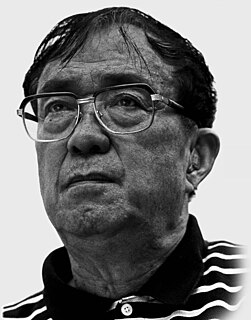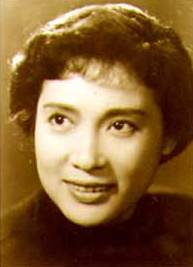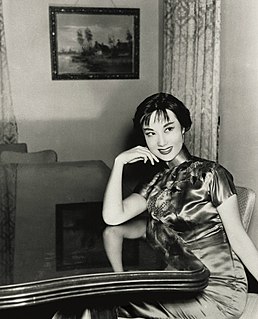Related Research Articles

Shaw Brothers (HK) Ltd. was the largest film production company of Hong Kong.
Mandopop refers to Mandarin popular music. The English term was coined around 1980 soon after "Cantopop" became a popular term for describing popular songs in Cantonese; "Mandopop" was used to describe Mandarin-language popular songs of that time, some of which were versions of Cantopop songs sung by the same singers with different lyrics to suit the different rhyme and tonal patterns of Mandarin. It is now used as a general term to describe popular songs performed in Mandarin.

Xie Jin was a Chinese film director. He rose to prominence in 1957, directing the film Woman Basketball Player No. 5, and is considered one of the Third Generation directors of China. Most recently he was known for the direction of The Opium War.

The United Photoplay Service Company was one of the three dominant production companies based in Shanghai, China during the 1930s, the other two being the Mingxing Film Company and the Tianyi Film Company, the forerunner of the Hong Kong-based Shaw Brothers Studio.

Love and Duty is a 1931 Chinese silent film, directed by Bu Wancang and starring Ruan Lingyu and Jin Yan. Long considered lost, it was accidentally rediscovered in Uruguay in the 1990s, and almost immediately hailed as one of the greatest Chinese silent films. Like many Chinese silent films, it features both Chinese and English intertitles.
Diao Chan is a 1938 Chinese sound film directed by Bu Wancang and produced by Zhang Shankun's Xinhua Film Company. The film is a portrayal of one of the "Four Beauties" of ancient China, in this case the titular Diaochan, from the late Eastern Han Dynasty era. Like Diaochan, the film is also known by the literal translation of her name, the Sable Cicada.
Elliot Ngok Wah, or Yueh Hua, was a Shanghai-born Hong Kong actor, later based in Canada, with Shaw Brothers Studio and TVB. One of the most versatile and prolific leading actors of Shaw Brothers, he starred in five to ten films per year in his heyday, playing roles ranging from foolish drunks to scholarly warriors.

Li Lili was a Chinese film actress and singer. Her films Little Toys, The Big Road and Storm on the Border were blockbusters of the 1930s and 1940s. She was sometimes called "China's Mae West".

Hu Die, also known by her English name Butterfly Wu, was one of the most popular Chinese actresses during the 1920s and 1930s. She starred in The Burning of the Red Lotus Temple, which started a craze for martial arts films, Sing-Song Girl Red Peony, China's first sound film, and what is considered her best film, Twin Sisters. She was voted China's first "Movie Queen" in 1933, and won the Best Actress Award at the 1960 Asian Film Festival for her performance in Rear Door.

Qin Yi is a Chinese film and drama actress. She gained fame for her stage performances in the war-time capital Chongqing during the Second Sino-Japanese War. After the war, she became one of China's most popular film actresses throughout the 1950s and the 1960s, and was recognized as one of the country's top four actresses. Premier Zhou Enlai called her the "most beautiful woman in China".
Xu Zheng is a Chinese actor and director best known for acting in comedic roles. Xu directed, co-wrote, co-produced and starred in Lost in Thailand (2012) and Lost in Hong Kong (2015), two of the highest-grossing films in China. He also co-produced and starred in Dying to Survive (2018), another box office megahit.

Wang Renmei was a famous Chinese actress and singer nicknamed the "Wildcat of Shanghai". She was mainly active during the 1930s, and her most notable film was the 1934 Song of the Fishermen directed by Cai Chusheng, which was the first Chinese film to win an international prize. In 2005, she was chosen as one of the 100 best actors of the 100 years of Chinese cinema.

Ye Qianyu was a Chinese painter and pioneering manhua artist. In 1928, he cofounded Shanghai Manhua, one of the earliest and most influential manhua magazines, and created Mr. Wang, one of China's most famous comic strips.
Situ Huimin, was a Chinese film director, screenwriter and actor, born in Kaiping, Guangdong.

Li Li-hua was a Chinese actress, better known as an actress from the Shaw Brothers Studio. In 1957, Li married Hong Kong actor and director Yan Jun (嚴俊).
Qian Shunying, better known by her stage name Ouyang Sha-fei, was a Chinese actress.
Luke Him Sau was a Chinese architect who practiced in the early and mid twentieth century. During the late 1920s, Luke was one of the first Chinese students to be trained at the Architectural Association School of Architecture (AA) in London, and studied under Eric Rawlsham Jarrett, Charles Stanley White, Stephen Rowland Pierce and Eric Leslie Bird.

Shu Xiuwen, also romanized as Shu Hsiu-wen, was a Chinese film and stage actress, as well as the first voice actress in China. She grew up in poverty but made a name for herself in the drama and film industry of Shanghai before the Second Sino-Japanese War, and then in the wartime capital Chongqing. She starred in numerous films and stage plays, including her most acclaimed film The Spring River Flows East, and was recognized as one of China's top four actresses.
Wang Yin was a Chinese actor who won the Golden Horse Award for Best Leading Actor twice, in 1962 and 1971.
References
- ↑ China's Screen 1981 "He then first joined the Tianyi Film Company, where he appeared in three films, and later the progressive Shanghai Amateurs Association. In 1937, he went to Chongqing with the Association. In 1940, he joined the China Film Studio and appeared in JAPANESE SPY, YOUTH OF CHINA, RECOVER THE LOST LAND, and others. Later, he appeared in 8,000 LI OF CLOUD AND MOON (1946) and TEARS OF YANGTZE (1947). In spring of 1948, he went to Hong Kong and began to ...
- ↑ Paul G. Pickowicz - China on Film: A Century of Exploration, Confrontation, and Controversy 14422117922013 - Libin, played by the popular actor Tao Jin, who spent most of the war doing cultural work in Chongqing, fantasizes about what China will be like when victory is achieved. The country, he predicts, will be peaceful (heping), democratic (minzhu), and free (ziyou), and the people will be happy (xingfu). Filial to the core, they plan to invite her father to live with them, and to produce a grandson for his enjoyment.
- ↑ Lily Xiao Hong Lee Biographical Dictionary of Chinese Women: V. 2: Twentieth Century 131549924X - 2016 - In the meantime, Li Lihua had grown closer to the actor Tao Jin, who co-starred with her in Sworn to the Sea (Haishi) in 1948 and A Cultivated Family (Shi lichuan jia) in 1950. They parted at the beginning of 1951, however, after repeated calls from Tao Jin's wife that he return to Shanghai. In the early 1950s, another new studio appeared in Hong Kong called Changcheng.